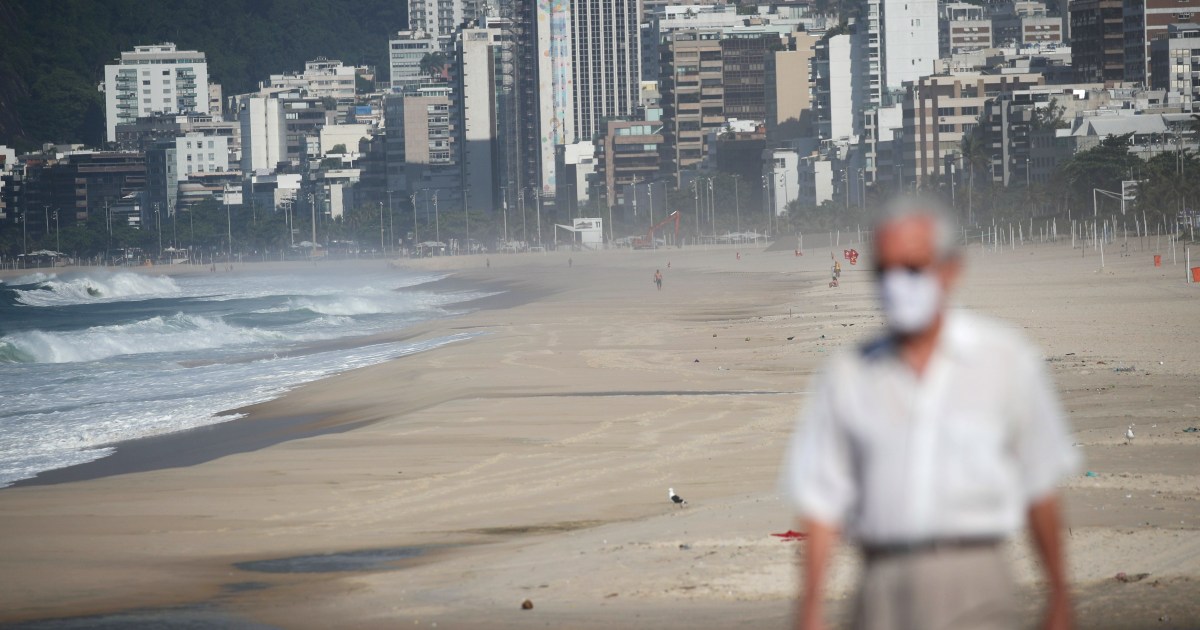
Brazil is holding talks with the United States to import excess COVID-19 vaccines, the Brazilian foreign ministry said on Saturday as the South American nation struggles to curb rising coronavirus infections and deaths.
The ministry has tweeted that, along with Brazil’s embassy in Washington, it has been in talks with the U.S. government since March 13 “to make it possible for Brazil to import surplus vaccines available in the United States.”
The announcement comes after U.S. President Joe Biden’s administration said Thursday it would “lend” 2.5 million doses of AstraZeneca’s COVID-19 vaccine to Mexico and 1.5 million doses more in Canada amid a dose overdose.
The government of Brazilian President Jair Bolsonaro is facing increasing pressure to account for his government’s handling of the COVID-19 pandemic, as well as the slow deployment of vaccines.
The country is experiencing an increase in coronavirus infections and deaths, as more than 290,000 people have died since the beginning of the pandemic, the second highest in the world after the United States.
To date, more than 11.8 million cases of COVID-19 have been reported in Brazil, according to data from Johns Hopkins University.
Since March 13, the Brazilian government, through Itamaraty and the embassy in Washington, in coordination with the Ministry of Health, has been negotiating with the United States government to make it possible for Brazil to import surplus vaccines available in the states. Units.
– Itamaraty Brasil 🇧🇷 (@Itamaraty_EN) March 20, 2021
On Saturday, the health ministry said 79,069 new cases were recorded in the previous 24-hour period, along with 2,438 additional coronavirus-related deaths.
The country’s health network is also nearly collapsed in several parts of the country, as local and state officials have tried in recent weeks to impose stricter restrictions in an effort to curb the spread of the virus.
The beaches of Rio de Janeiro were closed to the public over the weekend, and Mayor Eduardo Paes urged residents to stay home amid what he described as a “very difficult” situation.
“Either we are aware of it and we respect lives, or we will live in a difficult situation to manage in the coming days,” he added, as police officers took up positions in front of the beaches of Copacabana, Ipanema and Barra de Tijuca.
It was the first time Rio’s beaches were closed to the public since they reopened in July last year.
The governor of the state of Sao Paulo, Joao Doria, earlier this month also imposed a two-week closure with “red code,” shutting down non-essential businesses and restricting other services.
The measures have sparked some protests across Brazil, while police authorities have broken off large meetings that violated the restrictions.
Daniel Schweimler, of Al Jazeera, reporting from Buenos Aires, said Saturday that the problem is that there have been contradictory statements and measures by political leaders across Brazil.
While the mayor of Rio de Janeiro closed the beaches, Schweimler said Bolsonaro has encouraged people to go “to take as much vitamin D and sun as they can because he says it’s the best way to fight the coronavirus.”
“So you really have this big political problem: those who are imposing measures to try to fight the pandemic and the president and his allies saying they are doing a good job, they are treating it the best they can, it’s not their fault and it really urges to people doing business as usual, ”Schweimler said.
Bolsonaro, a skeptical COVID-19 who has shunned public health measures and downplayed the threat of the coronavirus, has asked Brazil’s Supreme Court to overturn closure orders, local media reported on Friday.
“They impose a state of siege, which is unconstitutional. They cannot do this without the approval of Congress. They humiliate the population as they say they save lives. How they can save lives, they are starving, ”said Bolsonaro.
 Brazilian President Jair Bolsonaro faces criticism over pandemic management by his government [File: Ueslei Marcelino/Reuters]
Brazilian President Jair Bolsonaro faces criticism over pandemic management by his government [File: Ueslei Marcelino/Reuters]
The far-right president appointed Brazil’s fourth health minister since the pandemic began last week, saying the country was entering a “more aggressive” phase in the fight against the virus.
Marcelo Queiroga, cardiologist, has committed to carry out Bolsonaro’s policies.
Meanwhile, the Brazilian government has struggled to administer COVID-19 vaccines, issuing at least one dose to about 5.4 percent of the population so far.
Brazil in January approved two vaccines for emergency use: AstraZeneca from the United Kingdom and CoronaVac, developed by China.
The country said last week that it had ordered 100 million doses of the Pfizer-BioNTech vaccine and 38 million from Johnson & Johnson, while negotiating 13 million doses of the Moderna Inc. vaccine.